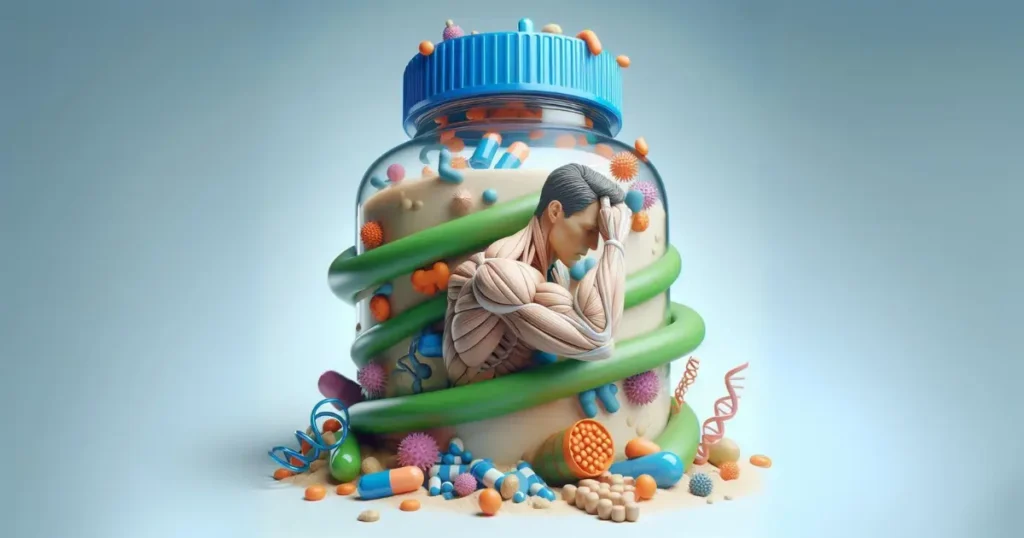
Protein is one of the three macronutrients, the other two being fat and carbohydrates. These are indispensable for the body’s optimal operation. Nevertheless, an excessive amount of protein, particularly when it is devoid of fat or carbohydrates, can be detrimental. Given the prevalence of numerous high-protein regimens, it is important to be cognizant of this.
Protein toxicity occurs when the body consumes an excessive amount of protein without sufficient amounts of fat and carbohydrates over an extended period of time. This condition is also referred to as “rabbit starvation” or “mal de caribou.” The term “rabbit starvation” or “mal de caribou” refers to the consumption of only extremely lean proteins, such as rabbit, without any other nutrients. Therefore, despite the fact that you may be consuming an adequate amount of protein, your body is experiencing malnourishment due to a lack of other nutrients, such as fat and carbohydrates.
The liver and kidneys significantly influence protein metabolism. Consuming excessive amounts puts the body at risk of elevated levels of ammonia, urea, and amino acids in the blood. Despite its rarity, protein poisoning can be fatal due to elevated levels.
Symptoms of Protein Poisoning
Early detection of a protein overdose is crucial to prevent long-term health issues. Some common signs are:
- Nausea and Vomiting: Eating too much protein can make your liver unable to handle it properly, which can make you feel sick and throw up.
- Diarrhea: When you eat a lot of protein but not enough fat and carbs, it can make your digestive system work wrong, which can lead to diarrhea.
- Fatigue: Even though protein has a lot of calories, the body may not have enough energy if it doesn’t get enough carbs. This can make you feel tired and weak.
- Headaches: Electrolyte issues and not drinking enough water can lead to headaches that won’t go away.
- Mood Swings and Irritability: Not getting enough nutrients can make your brain work less well, which can cause mood changes and irritability.
- Hunger and Cravings: Even if you eat a lot of protein, your body may still tell you it’s hungry because it’s missing important nutrients like fats and carbs.
Causes of Protein Poisoning
Your body requires the following in order to function effectively:
- Protein
- Carbohydrates
- Fats
- Vitamins
- Minerals
If any of these are present in an excessive or insufficient quantity, functioning will deteriorate. Balance is crucial for optimal health, even if you are consuming an adequate amount of calories from a single macronutrient.
Excessive protein is defined as consuming more than 175 grams of protein for a 2,000-calorie diet, or more than 35% of the total calories consumed. The adequate macronutrient distribution range (AMDR) is the range of nutrients that is associated with reducing the risk of chronic disease while simultaneously satisfying the body’s nutritional requirements. Currently, the Institute of Medicine recommends the following AMDR:
- Protein: 10 to 35% of the total calorie intake
- Carbohydrate: Carbohydrates should make up 45 to 65 percent of your total calorie intake.
- Fat intake: while fat intake should range from 20 to 35 percent of total calories.
Excessive consumption of macronutrients outside the ADMR may exacerbate the risk of chronic disease and insufficient intakes of essential nutrients.
The AMDR includes exceptions for carbohydrate and lipid macronutrients, but excludes protein. Dietary exceptions include the ketogenic diet, which is characterized by a high proportion of fat, and plant-based diets, which may contain over 65% carbohydrates. Both of these regimens may provide health benefits.
When protein intake surpasses the AMDR, or 35 percent of calories, it does not yield the same benefits and can lead to protein toxicity.
Daily allowance
The recommended daily intake (RDI) for protein is 0.8 grams per kilogram (0.36 grams per pound) of body weight. This is the quantity required to satisfy the body’s fundamental requirements.
Nevertheless, protein requirements will differ based on your specific circumstances.
- Height
- Weight
- Activity level
- Health status
Protein requirements typically fall within the range of 1.2 to 2.0 grams per kilogram of body weight.
Risks and Complications
Ignoring the symptoms of protein poisoning can lead to serious health complications.
- Liver and Kidney Strain: Excessive protein can overwork the liver and kidneys, potentially leading to damage or failure.
- Nutrient Deficiencies: A diet overly focused on protein can result in deficiencies of essential nutrients, leading to long-term health issues.
- Metabolic Imbalances: Macronutrient intake imbalances can disrupt normal metabolic processes, affecting overall health and wellbeing.
What’s the treatment method?
Protein poisoning is relatively straightforward to address. It entails a reduction in protein intake as well as an increase in carbohydrate and fat consumption. It is advisable to establish a healthy equilibrium between the macronutrients, as previously mentioned.
Reducing protein intake to no more than 2.0 grams per kilogram of bodyweight and supplementing with a moderate quantity of healthy fats and carbohydrates can alleviate protein poisoning, increase fiber intake, and promote overall well-being. It is essential to maintain equilibrium.
What about high-protein diets?
It is improbable that protein poisoning will occur, as the majority of high-protein diets, such as Atkins, keto, and paleo, promote a higher intake of fat and a moderate amount of carbohydrates.
It is not advisable to completely eliminate carbohydrates and lipids. Finding a diet that is compatible with your lifestyle and satisfies your nutritional requirements is crucial. Additionally, it is crucial to eliminate any nutritional deficiencies.
Protein poisoning vs. protein toxicity
When the body is unable to metabolize protein and kidney function is insufficient, toxicity can develop. This is distinct from protein toxicity.
Protein poisoning is the result of an excessive ingestion of protein without the presence of carbohydrates and fat to balance out the nutrients. Protein toxicity is the accumulation of protein metabolic debris as a result of impaired kidney function.
Humans with kidney disease frequently experience protein toxicity when they consume an excessive amount of protein.
The bottom line
Protein poisoning is exceedingly uncommon. Nevertheless, it is important to be cognizant of the numerous diets that advocate for a high protein intake.
If you have specific inquiries regarding the quantity of each macronutrient required to meet your current health requirements and level of activity, consult a registered dietitian. Your requirements will fluctuate based on numerous variables.
While protein is essential for optimal performance, there is a limit to the abundance of a beneficial substance, especially when other macronutrients are deficient.


